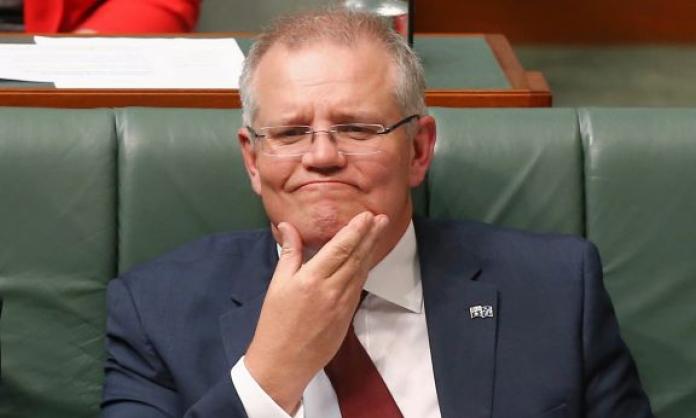Treasurer Scott Morrison says that Australia is becoming divided between the “taxed” and the “taxed-nots”, one group comprising hard-working wealth generators, the other an ever growing crowd of spongers living off the public purse.
It is the same coded class war rhetoric used by his predecessor Joe Hockey (remember “leaners” vs. “lifters”?) and its purpose is the same: to paint the rich as victims and keep alive the idea that government spending must be cut and soak-the-poor taxes introduced.
The Turnbull government will present an omnibus bill comprising $6.5 billion in spending cuts that have been held up since the May federal budget. In the name of “budget repair”, Turnbull and Morrison want to grab more money from the working class and hand it over to the rich. Discrediting welfare programs and demonising the poor is all part of the ideological smokescreen behind which the government hopes to push through these changes.
It’s a con.
If we’re talking about the taxed-not, let’s look at the households and offices of the super-rich. We could start, for example, at Raheen, the Kew mansion owned by the Pratt family, whose business, Pratt Consolidated Holdings, raked in $2.5 billion in revenue in 2013-14 but paid no tax.
Or we could pay a visit to the offices of the supplier of beef for McDonald’s Big Macs: revenue, $478 million. Tax paid? Sweet FA. In fact, there are 98 privately owned Australian companies, each with revenues of more than $200 million, that paid no income tax at all in 2013-14. Not a cent.
Some private companies are a little more generous with their funds, or perhaps hire inferior accountants. RG Withers Holdings, the grubby owner of hundreds of 7-Eleven stores that criminally underpay their staff, took $2.6 billion in turnover in 2013-14, declared taxable income of just $128 million. Lindsay Fox, owner of trucking company Linfox, paid $34 million in tax on $2 billion gross earnings.
Then there are the public companies – those listed on the stock exchange. Using Australian Taxation Office data, Oxfam Australia estimated last year that 40 percent of large public companies pay no tax. Others pay measly amounts: anything between 5 and 15 percent of their profits. Offshore tax havens, multiple spin-offs from the parent company, dodgy transfer pricing, by which high profits are floated off into low tax jurisdictions, all help to wipe out any tax liability for these Collins Street and Martin Place giants.
Company tax avoidance costs the Treasury $6 billion every year by the most modest assessment.
Let’s not forget the fat-cat taxed-not individuals. Fifty-six millionaires paid no income tax in 2013-14, not even the Medicare levy. By using advanced accounting bullshit artistry and blatant lies, these millionaires magicked away their tax liabilities. Some of them were particularly clever – 43 of the 56, with declared incomes of more than a million bucks, drove their taxable income right down to zero.
Joining the 56 millionaires in the club of champion tax evaders were another 117 taxed-not individuals on incomes of between half a million and a million bucks.
It’s an appalling state of affairs – and one that the Coalition, as the natural representative of these wealthy swine, is determined to keep in place.
That’s why they went to the election with a bid to cut company tax by $50 billion over the next decade.
That’s why the top 10 percent of taxpayers get three quarters of the benefit of the adjustment of tax brackets announced in the May budget.
And that’s why they’re trying to take $4.40 a week off Centrelink benefits to the unemployed and carers.
Workers, by contrast, get slugged every which way. Every time we go to the shops – 10 percent GST. No buying things in the name of the company for personal use for us. No family trusts for us. No $1,000 an hour accountants for us, no offshore bank accounts. Nope, full time wage workers pay a quarter or more of their income straight to Treasury. And because we spend pretty much all of our incomes, we pay GST on every cent we earn, while the rich, who have spare cash to invest, pay much less GST as a proportion of their total incomes. And this is only the surface of the underground golden lode.
Even more serious than this sort of sometimes legal, sometimes criminal, behaviour is the crime hidden in plain sight – the daily exploitation of the working class by the bosses.
It’s not enough to find out how little tax the rich pigs pay on the basis of their wealth. Where does their wealth come from in the first place? One way or another, from the workers they hire, who are paid far less than they produce. The tax system that the rich complain about touches only a fraction of the wealth they have accrued from exploiting others.
In fact, the capitalist economy is basically one big tax on workers, who create everything and keep society running but are denied any control over the process.
So if we want to talk about the taxed-nots, the leaners or the bludgers, we’ve got to look upward at the rich, not downward at the poor.









